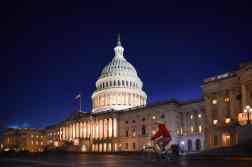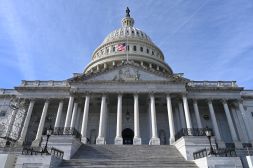House and Senate lawmakers today introduced legislation that would end the National Security Agency’s bulk collection of U.S. telephone records and significantly increase transparency into the secretive Foreign Intelligence Surveillance Court process.
The bill, the USA Freedom Act, is authored by Sen. Patrick Leahy, D-Vt., chairman of the Senate Judiciary Committee, and Rep. James Sensenbrenner Jr., R-Wis., one of the original authors of the USA Patriot Act in 2001. The introduction of the bill sets the stage for a major confrontation in Congress as another bill is likely to emerge from the House that will seek to reinforce existing NSA data collection authorities.
“Following 9/11, the USA Patriot Act passed the judiciary committees with overwhelming bipartisan support,” Sensenbrenner said in a statement. “The bill has helped keep Americans safe by ensuring information is shared among those responsible for defending our country and by enhancing the tools the intelligence community needs to identify and track terrorists. But somewhere along the way, the balance between security and privacy was lost. It’s now time for the judiciary committees to again come together in a bipartisan fashion to ensure the law is properly interpreted, past abuses are not repeated and American liberties are protected.”
The bill would end NSA’s bulk collection of Americans’ phone records under Section 215 of the USA Patriot Act and ensure other authorities cannot be used to justify similar collection activities. The bill also includes privacy and oversight provisions, including the creation of a special advocate to focus on the protection of privacy rights and civil liberties before the FISA Court, and requires more detailed public reporting about the numbers and types of FISA orders that are issued.
“This bill is a sensible middle ground between the need to gather intelligence on those who intend our country harm, while respecting the constitutional right of all Americans to keep their personal lives private,” said Faiza Patel, co-director of the Liberty and National Security Program at the Brennan Center for Justice. “Despite the claims of the NSA, the Patriot Act was never intended to authorize the bulk collection of Americans’ phone records. Leahy and Sensenbrenner have set the record straight.”
The legislation comes just hours before senior intelligence officials, including NSA Director Gen. Keith Alexander and Director of National Intelligence James Clapper, are scheduled to testify before the House Permanent Select Committee on Intelligence on potential changes to the FISA law. It also comes on the heels of a growing international scandal involving NSA’s targeting of the personal communications of several foreign leaders.




